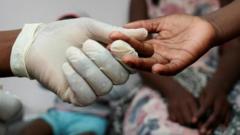Is US Aid Success Against AIDS Now Under Threat?

Understanding the Impact of Funding Cuts on HIV Treatment in South Africa
The landscape of HIV treatment and support in South Africa has faced a significant upheaval following the announcement of funding cuts by the United States government. These cuts have left thousands of HIV-positive individuals, including vulnerable populations such as sex workers, scrambling for alternatives to the care and medication that were previously accessible through USAID-funded clinics. The ramifications of these financial constraints not only threaten the health and wellbeing of those living with HIV but also pose serious risks to the ongoing advancements made in combating the epidemic. This article delves into the personal stories of individuals affected by these changes, the broader implications for public health, and the urgent need for sustained support in HIV research and treatment.
The Personal Toll of Funding Cuts
Gugu, a 54-year-old former sex worker, exemplifies the challenges many face in the wake of funding cuts. Her story highlights the precarious balance between health and socioeconomic realities. After finding out she was HIV-positive, Gugu has relied on antiretrovirals (ARVs) to manage her condition. These medications are crucial for suppressing HIV symptoms and preventing the progression to AIDS. However, with the closure of many USAID-funded clinics, her access to these life-saving medications has been put in jeopardy.
Challenges in Accessing Care
Gugu managed to obtain a bulk prescription of ARVs before her clinic closed, but her supply will run out in just a few months. The reliance on public hospitals for her next prescription poses significant challenges. These facilities often require patients to arrive early and wait for hours, a daunting prospect for individuals who may be balancing work and personal responsibilities. For sex workers, time is literally money, making long waits at public hospitals a disincentive to seek care.
Stigmatization and Fear
Another major barrier is the stigma that surrounds sex work and HIV. Gugu recounts a negative experience at her local hospital, where a nurse exhibited a lack of empathy and sensitivity towards her situation. This kind of treatment can discourage many from seeking necessary medical care. The fear of being judged, coupled with the risk of having personal information exposed, creates a hostile environment that can lead to medication non-compliance.
The Bigger Picture: Global Health Implications
The funding cuts made by the Trump administration have not only affected individuals but have also raised alarms among health organizations globally. According to UNAids, significant progress made in recent years to combat HIV/AIDS could be reversed. The report reveals that the annual numbers of new infections and AIDS-related deaths had reached their lowest levels in over three decades before these cuts were implemented.
Statistics That Matter
- New HIV infections have decreased by 40% since 2010.
- 4.4 million children have been protected from acquiring HIV since 2000.
- More than 26 million lives have been saved due to improved treatment and prevention methods.
However, these achievements are now at risk. UNAids warns that without immediate action and restored funding, we could see an additional six million new HIV infections and four million AIDS-related deaths by 2029. This potential regression in public health outcomes threatens not just South Africa but the global community, as the country has one of the highest rates of HIV in the world.
HIV Treatment in South Africa: A Success Story Under Siege
South Africa is home to approximately 7.7 million people living with HIV, the highest number globally. Remarkably, around 5.9 million of these individuals are currently receiving ARV treatment, leading to a 66% reduction in AIDS-related deaths since 2010. This progress can largely be attributed to extensive international support, particularly through the President's Emergency Plan for AIDS Relief (PEPFAR), initiated by former President George W. Bush in 2003. PEPFAR has invested over $100 billion into the global HIV response, making it the largest single-nation commitment to address a health crisis.
The Role of International Aid
Before the funding cuts, PEPFAR contributed approximately 17% of South Africa's HIV/AIDS program funding. This financial support helped facilitate various initiatives, including mobile clinics that provide easier access to treatment for marginalized populations. The recent cuts have raised concerns that infection rates could once again rise, reversing years of hard-earned progress.
Research and Development: A Critical Need
The repercussions of funding cuts extend beyond immediate treatment and care; they also jeopardize vital research aimed at finding a cure for HIV/AIDS and developing new vaccines. South Africa has been at the forefront of HIV research, contributing to global advancements that have benefitted millions worldwide. The absence of funding hampers the ability to conduct clinical trials and pursue innovative treatments.
The Future of HIV Research in South Africa
Researchers like Abdullah Ely from Wits University emphasize the importance of maintaining local research efforts. The Brilliant Consortium, which spans eight African nations, is focused on developing an HIV vaccine tailored to the needs of African communities. However, the loss of US funding has severely impeded their progress, causing delays and forcing researchers to seek alternative funding sources.
Alternative Funding Efforts
In light of the funding cuts, South African universities have requested a bailout to cover the lost resources. Recently, the Bill and Melinda Gates Foundation and the Wellcome Trust pledged financial support, but the amount falls significantly short of what is needed to sustain ongoing research efforts. The South African government has also promised additional funding, but experts warn that it may not be enough to fill the gap left by the US cuts.
The Road Ahead: Hope and Resilience
Despite the daunting challenges, there remains a flicker of hope. Gugu's determination to care for her nine-year-old child illustrates the resilience of those living with HIV. She dreams of a future where a cure could be found, enabling her to live a long and fulfilling life. However, she acknowledges that without continued support and advocacy, that dream may remain just out of reach.
As we navigate this complex landscape, it is crucial for global health organizations, governments, and communities to unite in their efforts to restore funding and prioritize HIV/AIDS treatment and research. The stakes are high, and the consequences of inaction could be devastating for future generations.
Frequently Asked Questions
What are antiretrovirals (ARVs)?
Antiretrovirals (ARVs) are medications used to manage HIV by suppressing the virus's replication in the body, enabling individuals to live healthier lives.
Why are funding cuts a concern for HIV treatment?
Funding cuts reduce the availability of essential medications and support services, potentially leading to increased rates of new infections and AIDS-related deaths.
How does stigma affect access to HIV treatment?
Stigma surrounding HIV and sex work can discourage individuals from seeking care, as they fear negative treatment or exposure of their personal information in healthcare settings.
What is the Brilliant Consortium?
The Brilliant Consortium is a collaborative effort among various African labs focused on developing an HIV vaccine tailored to the needs of African communities.
What role does international aid play in combating HIV/AIDS?
International aid provides critical funding for treatment programs, research, and preventive measures, making significant strides in reducing infection rates and improving health outcomes.
As the world continues to grapple with the challenges posed by HIV/AIDS, one thing remains clear: the fight is far from over. How can we ensure that the progress made is not only preserved but expanded upon in the years to come? #HIVAwareness #GlobalHealth #HealthEquity
Published: 2025-07-10 10:17:06 | Category: world



